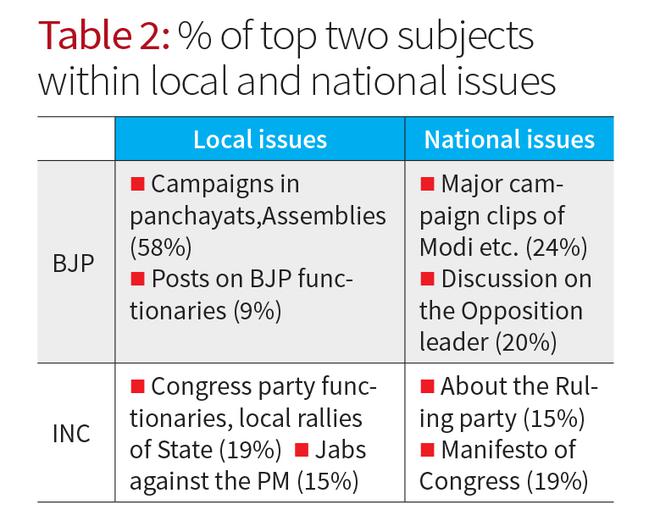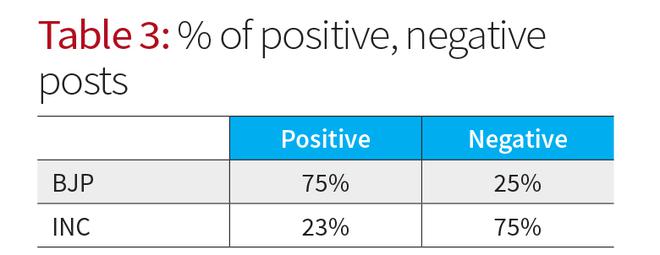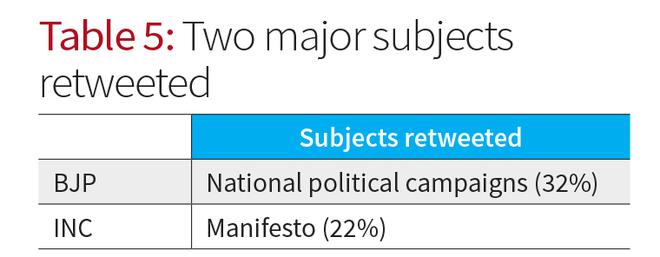As the 2024 Lok Sabha Elections draw close, all parties are diving headfirst into the digital realm, cementing their presence and that of their party beyond the traditional campaign trail. This study conducted by CSDS-Lokniti monitored the X handles of five spokespersons each from the Bharatiya Janata Party (BJP) and the Indian National Congress (INC). By the first week of April 2024, the study examined 798 tweets. Of these, 378 were attributed to spokespersons of the Congress party, while 420 were by those associated with the BJP.
Local and national issues
Out of all the posts, 53% of the BJP’s posts focused on local issues while 48% focused on national issues. It was 14% and 86% respectively for the Congress (Table 1).

For the BJP, among the 53% local issues, the most discussed were local campaigns in panchayats and Assemblies — covering almost 58% of all local issues. The most discussed national issues were political campaigns but these were mostly short clips of major rallies of Prime Minister Modi, Amit Shah, and J.P. Nadda, covering 24% of all national issues. For the Congress, among its 14% of local issues, the most discussed were Congress party functionaries and local rallies, covering almost 19% of all local issues. The most discussed national issues were posts covering the manifesto of the Congress, which covered 19% of all national issues, and posts critiquing the ruling party, which covered 15% of all national issues (Table 2).

Jibes and promises
For the BJP, of its 25% negative posts, 45% posts were targeted towards the Opposition, while of its 75% positive posts, 53% were related to posts of local and national political campaigns. For the Congress, of its 75% negative posts, 19% of posts critiqued the ruling party and 15% critiqued the Prime Minister while of its 23% positive posts, 46% were on posts of Congress party functionaries, and 44% on the Congress manifesto (Table 3).

Of the total tweets by both the BJP and Congress, 42% were retweets of other posts (Table 4).

Of the 41% retweeted posts of the BJP, 32% dealt with the political campaigns of either Mr. Modi, Mr. Shah or Mr. Nadda. Several were short clips of their national rallies. Of the 43% retweeted posts by Congress, 22% were based on the manifesto of Congress and 15% criticised the ruling party (Table 5).

Hashtags and freedom of speech
Of all the posts by the BJP, 28% made use of hashtags. Congress, on the other hand, had hashtags in 6% of all their posts (Table 6).

The posts made by the BJP appear more coordinated and strategic in comparison to the Congress. This conclusion is drawn based on the use of hashtags. Most BJP posts use the hashtags in two combinations: #BJP4Development, #ModiHaiToMumkinHai together; and #PhirEkBaarModiSaarkar, and #ApkiBaar400Paar #Viksit (localised) together. Congress, on the other hand, uses its respective hashtags sparingly without any discernible combination or pattern. They also lack a localised hashtag akin to that of the BJP, appearing less connected.
The BJP has long since established PM Modi as the face of their party and is seemingly continuing the trend this election. At the same time, the Congress too is focused on Mr. Modi. Instead of establishing Rahul Gandhi as a comparable figure to Modi, the Congress is attempting to undermine the validity of PM Modi’s candidature by exposing his and the ruling party’s inadequacies.
Sanjay Kumar is a Professor at CSDS. Aditi Singh is Assistant Professor at O.P. Jindal Global University, Anagha V. Nair and Subhayan Acharya Majumdar are researchers with CSDS







